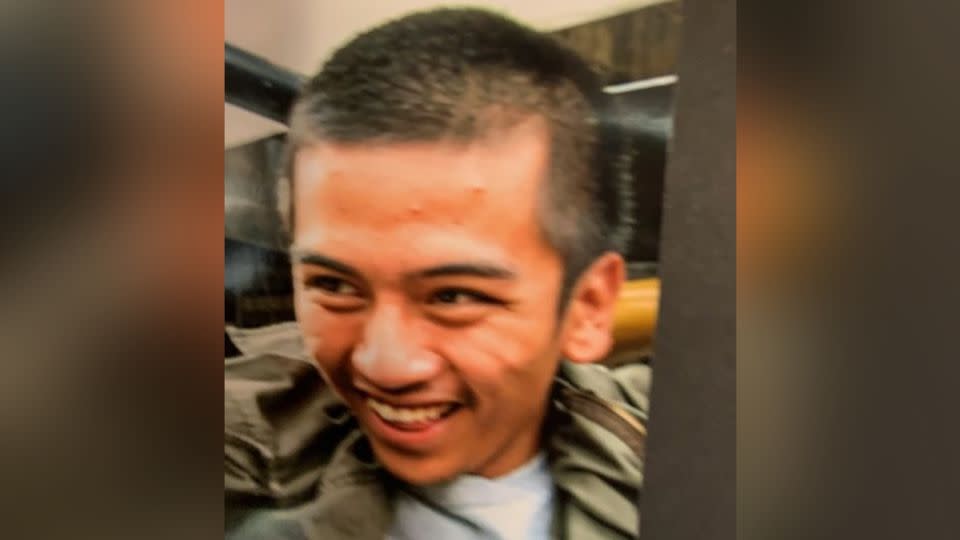A Northern California city has agreed to pay $7.5 million to the family of a 30-year-old man who died days after police restrained him in 2020the parties announced Wednesday, resolving a wrongful death lawsuit filed by the family.
Angelo Quinto’s family filed the lawsuit against the city of Antioquia in February 2021, claiming he was experiencing a mental health episode and died days after police officers knelt on the back of his neck for nearly five minutes to subdue him. .
A year later, the The Contra Costa County District Attorney’s Office said an internal examination determined that Quinto’s neck area was undamaged; that he saw “no evidence of criminal wrongdoing on the part of Antioquia police officers” in Quinto’s death; and that the officers “engaged with Quinto in a manner that was lawful and objectively reasonable under the circumstances.”
“Although there are conflicting medical opinions regarding the cause of death, accounts of what happened in the room are consistent among all witnesses, as no police officer pressed Quinto’s neck,” the district attorney’s office said in 2022.
Police restrained Quinto at the family’s Antioquia home on Dec. 23, 2020, after his sister called police because he had a mental health episode and she feared he would hurt their mother, the family’s lawyers said he said. Quinto lost consciousness and was taken to a hospital, where he was pronounced dead three days later, the family’s lawyers said in the lawsuit.
Quinto’s cause of death “was Excited Delirium Syndrome due to drug intoxication, psychiatric conditions, physical exertion and cardiac arrest,” an autopsy performed five days after Quinto was restrained by officers found, the public prosecutor’s office said in 2022 .
On Wednesday, an attorney for Quinto’s family, Ben Nisenbaum, said Quinto’s family was the “driving force” behind legislation eventually signed by Governor Gavin Newsom, prohibiting excited delirium and other similar terms from being listed as a cause of death in California. He said a coroner’s inquest listed excited delirium – which is “characterized by agitation, aggression, acute distress and sudden death”. according to the National Library of Medicine – as the cause of Quinto’s death.
John L. Burris, another attorney for the family, said the settlement shows that something positive can come from a tragedy. “This is a case where the family, from day one, took the tragedy and the loss and the circumstances surrounding Angelo’s death and tried to turn it into a positive thing, and they did,” Burris said.
“The real advantage that comes from this case is the collective efforts on their part and the will on the part of city officials, including the mayor’s office… to bring about positive change,” Burris said.
Antioquia Mayor Lamar Hernandez-Thorpe said that although two people died in police custody during the first 30 days of his administration, he was “under the impression that it was no big deal.”
“7.5 million dollars later — and that’s never enough to compensate someone’s loved one — we recognized it was a bigger problem than we understood,” the mayor said at Wednesday’s press conference, adding that the city council had already had fought the body- cameras used for police officers.
“Frankly, years of failed leadership have brought us to this moment, but I’m happy to say we’ve done a tremendous amount of work in terms of changing the culture, not just in the police department but also in the city, and taking these concerns seriously,” said the mayor. “We have done a lot in terms of establishing reforms that I believe have built a safer community for every segment of our city and to ensure that people get justice when we are wrong.”

During the news conference, Quinto’s stepfather, Robert Collins, thanked the mayor and city council for listening to his family’s calls for change.
“We found a city that heard many of our pleas and began to make the necessary changes,” Collins said. “It is a process of change. We’re not done here yet. It is a process that will take many years.”
Thanks to the family’s plea, police cameras “are now a reality in Antioch,” and a non-police mental health response team “prevented other people from dying,” Collins said.
Quinto’s sister, Isabella Collins, described her brother as “multifaceted.” He was artistic, loved cooking and was always trying to improve, she said.
“It’s a kind of justice that we’ve been able to work towards reform and positive change – legislative and advocacy change,” said Isabella Collins. “I think if my brother couldn’t have a life, maybe that’s what he would choose, that impact on other people’s lives and other people’s legacies, the ability to pave the way for some justice and fairness for others.”
For more news and newsletters from CNN, create an account at CNN.com




































